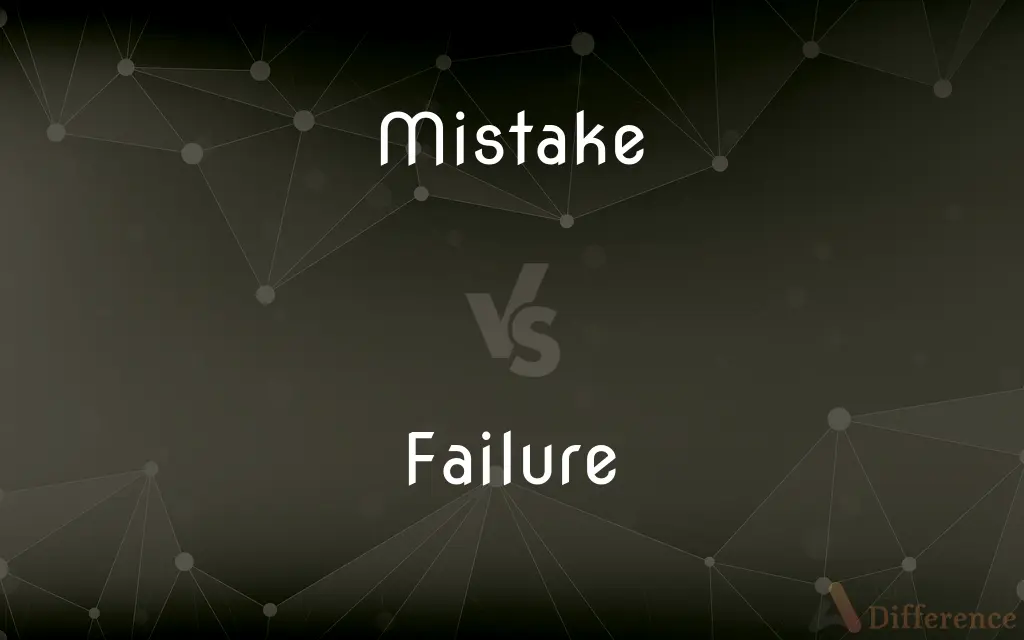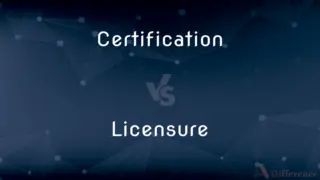Mistake vs. Failure — What's the Difference?
Edited by Tayyaba Rehman — By Urooj Arif — Updated on March 29, 2024
A mistake is an incorrect action due to misunderstanding or carelessness, while a failure is an inability to meet a desired outcome or objective.

Difference Between Mistake and Failure
Table of Contents
ADVERTISEMENT
Key Differences
A mistake typically refers to a wrong decision or action, often arising from a lack of understanding or attention. Mistakes are usually isolated incidents that can be corrected or learned from. For example, typing the wrong word in a sentence is a mistake. On the other hand, failure denotes a broader inability to achieve a specific goal or standard, often despite efforts. Failures can result from multiple mistakes, misjudgments, or external factors beyond one’s control. Failing to pass a test despite studying hard is an example of failure.
Mistakes are often seen as opportunities for learning and growth. They are part of the trial-and-error process that leads to better understanding and improvement. Correcting a mistake can lead to a clearer path forward. Whereas failure, although more disheartening, can provide profound insights and drive significant changes in strategy or direction. The experience of failure can be a catalyst for deep reflection and renewed motivation.
The scope of mistakes is generally limited to specific actions or decisions and is usually identifiable and correctable. This makes mistakes less daunting and often easier to overcome. Whereas the scope of failure is broader, encompassing an entire project, objective, or goal that was not met, making it seem more significant and sometimes harder to bounce back from.
The emotional impact of a mistake is usually less severe than that of a failure. Mistakes, being smaller in scale and consequence, can often be brushed off or rectified with minimal distress. However, failure tends to carry a heavier emotional weight, leading to feelings of disappointment, frustration, or even depression, which may require more effort and time to work through.
The societal perception of mistakes and failures also differs. Mistakes are generally more acceptable and understood as part of the learning process. Society often encourages learning from mistakes to prevent their recurrence. Failure, though increasingly recognized for its role in growth and innovation, can still be stigmatized or viewed negatively, impacting one’s confidence and willingness to take future risks.
ADVERTISEMENT
Comparison Chart
Definition
An incorrect action or decision due to misunderstanding or carelessness.
Inability to achieve a desired outcome or goal.
Scope
Limited to specific actions or decisions.
Broader, affecting entire projects or goals.
Opportunity for Growth
Often seen as learning opportunities.
Provides insights and motivation for significant changes.
Emotional Impact
Generally minor, easier to overcome.
Heavier emotional weight, can lead to significant distress.
Societal Perception
More acceptable, seen as part of learning.
Often stigmatized, though recognized for its role in growth.
Compare with Definitions
Mistake
An action or judgment that is misguided or wrong.
Making a spelling mistake in a document.
Failure
Inability to perform a function or task.
The system's failure was due to outdated software.
Mistake
A misunderstanding or incorrect interpretation.
It was a mistake to assume the instructions were clear.
Failure
Lack of success in achieving something.
The experiment ended in failure due to incorrect parameters.
Mistake
A poor decision or choice.
Choosing to wait until the last minute to study was a mistake.
Failure
A cessation of operation or functionality.
The engine’s failure left the car stranded.
Mistake
An error in calculation or measurement.
The accountant caught a mistake in the financial report.
Failure
Not passing a test or examination.
Her failure of the final exam meant she had to retake the course.
Mistake
A slip in etiquette or protocol.
Wearing casual clothes to the formal meeting was a mistake.
Failure
Falling short of a required standard.
His failure to comply with the regulations resulted in fines.
Mistake
An act or judgement that is misguided or wrong
She made the mistake of thinking they were important
Coming here was a mistake
Failure
Failure is the state or condition of not meeting a desirable or intended objective, and may be viewed as the opposite of success. The criteria for failure depends on context, and may be relative to a particular observer or belief system.
Mistake
Be wrong about
Because I was inexperienced I mistook the nature of our relationship
Failure
Lack of success
An economic policy that is doomed to failure
Mistake
An error or fault resulting from defective judgment, deficient knowledge, or carelessness.
Failure
The neglect or omission of expected or required action
Their failure to comply with the basic rules
Mistake
A misconception or misunderstanding.
Failure
The action or state of not functioning
A chance engine failure
Symptoms of heart failure
Mistake
To understand wrongly; misinterpret
Mistook my politeness for friendliness.
Failure
The condition or fact of not achieving the desired end or ends
The failure of an experiment.
Mistake
To recognize or identify incorrectly
He mistook her for her sister.
Failure
One that fails
A failure at one's career.
Mistake
To make a mistake; err.
Failure
The condition or fact of being insufficient or falling short
A crop failure.
Mistake
(transitive) To understand wrongly, taking one thing or person for another.
Sorry, I mistook you for my brother. You look very similar.
Don't mistake my kindness for weakness.
Failure
A cessation of proper functioning or performance
A power failure.
Mistake
To misunderstand (someone).
Failure
Nonperformance of what is requested or expected; omission
Failure to report a change of address.
Mistake
To commit an unintentional error; to do or think something wrong.
Failure
The act or fact of failing to pass a course, test, or assignment.
Mistake
To take or choose wrongly.
Failure
A decline in strength or effectiveness.
Mistake
An error; a blunder.
There were too many mistakes in the test, that unfortunately you failed.
Failure
The act or fact of becoming bankrupt or insolvent.
Mistake
(baseball) A pitch which was intended to be pitched in a hard-to-hit location, but instead ends up in an easy-to-hit place.
Failure
State or condition of not meeting a desirable or intended objective, opposite of success.
Mistake
To take or choose wrongly.
Failure
Omission to do something, whether or not it was attempted, especially something that ought to have been done.
Mistake
To take in a wrong sense; to misunderstand misapprehend, or misconceive; as, to mistake a remark; to mistake one's meaning.
My father's purposes have been mistook.
Failure
An object, person or endeavour in a state of failure or incapable of success.
Mistake
To substitute in thought or perception; as, to mistake one person for another.
A man may mistake the love of virtue for the practice of it.
Failure
Termination of the ability of an item to perform its required function; breakdown.
Mistake
To have a wrong idea of in respect of character, qualities, etc.; to misjudge.
Mistake me not so much,To think my poverty is treacherous.
Failure
Bankruptcy.
Mistake
To err in knowledge, perception, opinion, or judgment; to commit an unintentional error.
Servants mistake, and sometimes occasion misunderstanding among friends.
Failure
Cessation of supply, or total defect; a failing; deficiency; as, failure of rain; failure of crops.
Mistake
An apprehending wrongly; a misconception; a misunderstanding; a fault in opinion or judgment; an unintentional error of conduct.
Infallibility is an absolute security of the understanding from all possibility of mistake.
Failure
Omission; nonperformance; as, the failure to keep a promise.
Mistake
Misconception, error, which when non-negligent may be ground for rescinding a contract, or for refusing to perform it.
Failure
Want of success; the state of having failed.
Mistake
A wrong action attributable to bad judgment or ignorance or inattention;
He made a bad mistake
She was quick to point out my errors
I could understand his English in spite of his grammatical faults
Failure
Decay, or defect from decay; deterioration; as, the failure of memory or of sight.
Mistake
An understanding of something that is not correct;
He wasn't going to admit his mistake
Make no mistake about his intentions
There must be some misunderstanding--I don't have a sister
Failure
A becoming insolvent; bankruptcy; suspension of payment; as, failure in business.
Mistake
Part of a statement that is not correct;
The book was full of errors
Failure
A failing; a slight fault.
Mistake
Identify incorrectly;
Don't mistake her for her twin sister
Failure
An act that fails;
His failure to pass the test
Mistake
To make a mistake or be incorrect
Failure
An event that does not accomplish its intended purpose;
The surprise party was a complete failure
Failure
Lack of success;
He felt that his entire life had been a failure
That year there was a crop failure
Failure
A person with a record of failing; someone who loses consistently
Failure
An unexpected omission;
He resented my failure to return his call
The mechanic's failure to check the brakes
Failure
Inability to discharge all your debts as they come due;
The company had to declare bankruptcy
Fraudulent loans led to the failure of many banks
Failure
Loss of ability to function normally;
Kidney failure
Common Curiosities
What is the main difference between a mistake and a failure?
A mistake is a wrong action or decision often due to misunderstanding, while a failure is an inability to achieve a desired outcome or goal.
Are mistakes always bad?
Not necessarily; mistakes can be opportunities for learning and improvement.
What is the role of perseverance in overcoming failure?
Perseverance is crucial in learning from failure, developing resilience, and eventually achieving success.
Is there a way to prevent mistakes?
While not all mistakes can be prevented, careful planning, attention to detail, and learning from past errors can reduce their likelihood.
Is it possible to learn from failure?
Absolutely, failure often provides valuable lessons and insights that can lead to personal growth and success.
How can I deal with failure?
Acknowledge your feelings, learn from the experience, and create a plan for moving forward with new strategies.
How do societal views on failure affect individuals?
Stigma or negativity towards failure can discourage risk-taking and innovation, impacting personal and professional growth.
How can teachers encourage students to learn from mistakes?
By creating a supportive environment where mistakes are viewed as part of the learning process, not as failures.
Can a mistake lead to failure?
Yes, repeated or significant mistakes can lead to failure if not addressed.
What is the first step in turning failure into a success?
The first step is to analyze the failure, understand its causes, and identify lessons learned.
Can failure be a positive experience?
While challenging, failure can motivate individuals to reassess and improve their strategies, making it a catalyst for growth.
Can the fear of failure be overcome?
Yes, through building self-confidence, accepting that failure is a part of learning, and focusing on effort and growth rather than perfection.
Why is failure often considered a taboo topic?
Cultural and societal norms often equate failure with weakness, discouraging open discussion about its benefits and lessons.
How should one respond to making a mistake?
Acknowledge it, learn from it, make any necessary corrections, and move forward.
How does failure contribute to innovation?
Failure prompts reevaluation and exploration of new approaches, driving creativity and innovation.
Share Your Discovery

Previous Comparison
Luminance vs. Illuminance
Next Comparison
Certification vs. LicensureAuthor Spotlight
Written by
Urooj ArifUrooj is a skilled content writer at Ask Difference, known for her exceptional ability to simplify complex topics into engaging and informative content. With a passion for research and a flair for clear, concise writing, she consistently delivers articles that resonate with our diverse audience.
Edited by
Tayyaba RehmanTayyaba Rehman is a distinguished writer, currently serving as a primary contributor to askdifference.com. As a researcher in semantics and etymology, Tayyaba's passion for the complexity of languages and their distinctions has found a perfect home on the platform. Tayyaba delves into the intricacies of language, distinguishing between commonly confused words and phrases, thereby providing clarity for readers worldwide.














































